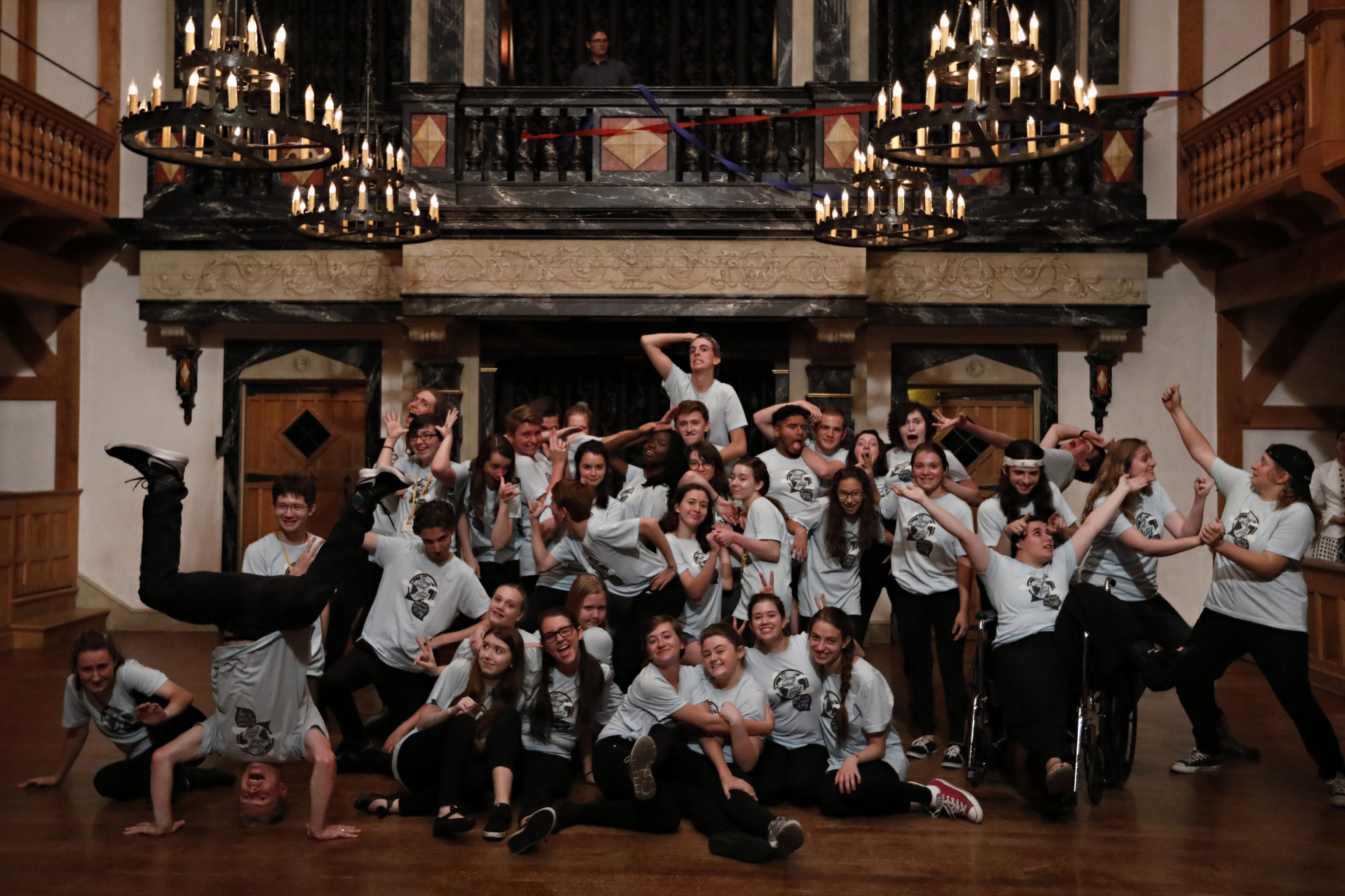Summer never really sleeps at the ASC, especially not for

me. Hi! I’m Lia Wallace. You may remember me from such ASCTC blog posts as Getting Ralph’d and What I Learned on my Summer Vacation: a 2016 ASCTC retrospective. Or you might know me as the ASC Theatre Camp Director, or the College Prep Programs Manager, or “the lady who knits while walking.” I’ll answer to any of those names, but the campers know me as Lia.
I’ve been thinking about them (the campers) a lot lately. When I wrote a similar blog post about ASCTC 2016, I ended it by saying, “I have a lot to learn — and that’s okay. I had fifty-nine amazing teachers this summer, I can’t wait to learn whatever the campers at ASCTC 2017 will undoubtedly teach me.”
Words cannot describe the accuracy of that statement. Which won’t, of course, stop me from trying.
Here are 5 of the most memorable lessons I learned from my sixty-six teachers, and I present them to you here with some assistance from the campers’ own words (provided anonymously in a post-camp survey, or used with that camper’s permission).
1. Ask the campers what they want (and really listen to their answers).
A new model for the mid-session Showcase.
“I honestly don’t understand the point of showcase. If we didn’t have to worry about memorizing those extra lines and blocking, we could make our main show THAT MUCH better. It was a great experience, just an unnecessary one.”
The history of the mid-session Showcase performance has been wildly inconsistent. We’ve never been able to really nail down a format that serves the mission of camp — even though the mid-session Showcase is essential to the mission of camp. As one camper said:
“I think taking on the showcase is a crazy extra endeavor. It adds a crazy amount of stress and takes away time that could have been devoted to more lectures or text prep.”
To which I say: YES. And AMEN. That extra challenge of the added fourth show, which has more people (a cast of 30 is very different from a cast of 10), less time (two weeks is very different from three), and a totally different director (or two or three) creates a nearly repertory performance experience out of camp. That fourth show (which I emphasize again because three is not enough) requires focus, commitment, adaptability, collaboration, and patience at a whole new level, and is one of the chief reasons why our program is so much more than just a regular summer camp. As one camper observed:
“I know people didn’t like it, but it was important. Please don’t cut it.”
 I’m not going to cut it (ever). But how do I make sure I’m balancing the needs of my campers with the goals of our program while also creating a cohesive piece of theatre that A) showcases more of our camper’s talents and B) challenges them to C) feel safe while tackling staging situations that frighten or intimidate them without D) overwhelming them with far too much work (one the one hand) or E) boring them to tears (on the other)? I can’t read minds. How am I supposed to figure out what they want and need?
I’m not going to cut it (ever). But how do I make sure I’m balancing the needs of my campers with the goals of our program while also creating a cohesive piece of theatre that A) showcases more of our camper’s talents and B) challenges them to C) feel safe while tackling staging situations that frighten or intimidate them without D) overwhelming them with far too much work (one the one hand) or E) boring them to tears (on the other)? I can’t read minds. How am I supposed to figure out what they want and need?
Well… I could ask them.
See, I saw a trend in the 2016 campers’ post-camp survey responses to many of the questions (not just the ones about Showcase): in general, campers knew what they wanted to do. Or at least, they had ideas about what they wanted to try, if given the chance — and Showcase could be the perfect chance.

So, when campers filled out their regular audition forms for ASCTC 2017, listing their previous roles and special talents and other normal audition form information, they also found themselves answering a bunch of strange and strangely specific questions, like:
- Which moment/scene/sequence from a Shakespearean play (not included in the session’s plays) would you most want to perform?
- Which Shakespearean character do you most want to play at some point in your life, and why? Is there a particular moment in that character’s play that you love? Or does the character have a certain aspect that draws you to them?
- Name something you’d like to do onstage, but you’ve never been able to do because of nerves or fear.
The answers to those questions provided the raw material from which I built each Session’s showcase: two completely different shows I cobbled together using moments from throughout Shakespeare’s canon, drawing on the campers’ requests and taking into account casting for the main shows.
Now, to be clear, I didn’t just give everybody what they wanted. If I had, the half a dozen campers in the first session named Much Ado about Nothing’s strong-willed and sharp-tongued Beatrice as their “bucket list” role to play would all have been playing Beatrice. Six Beatrices is too many Beatrices.
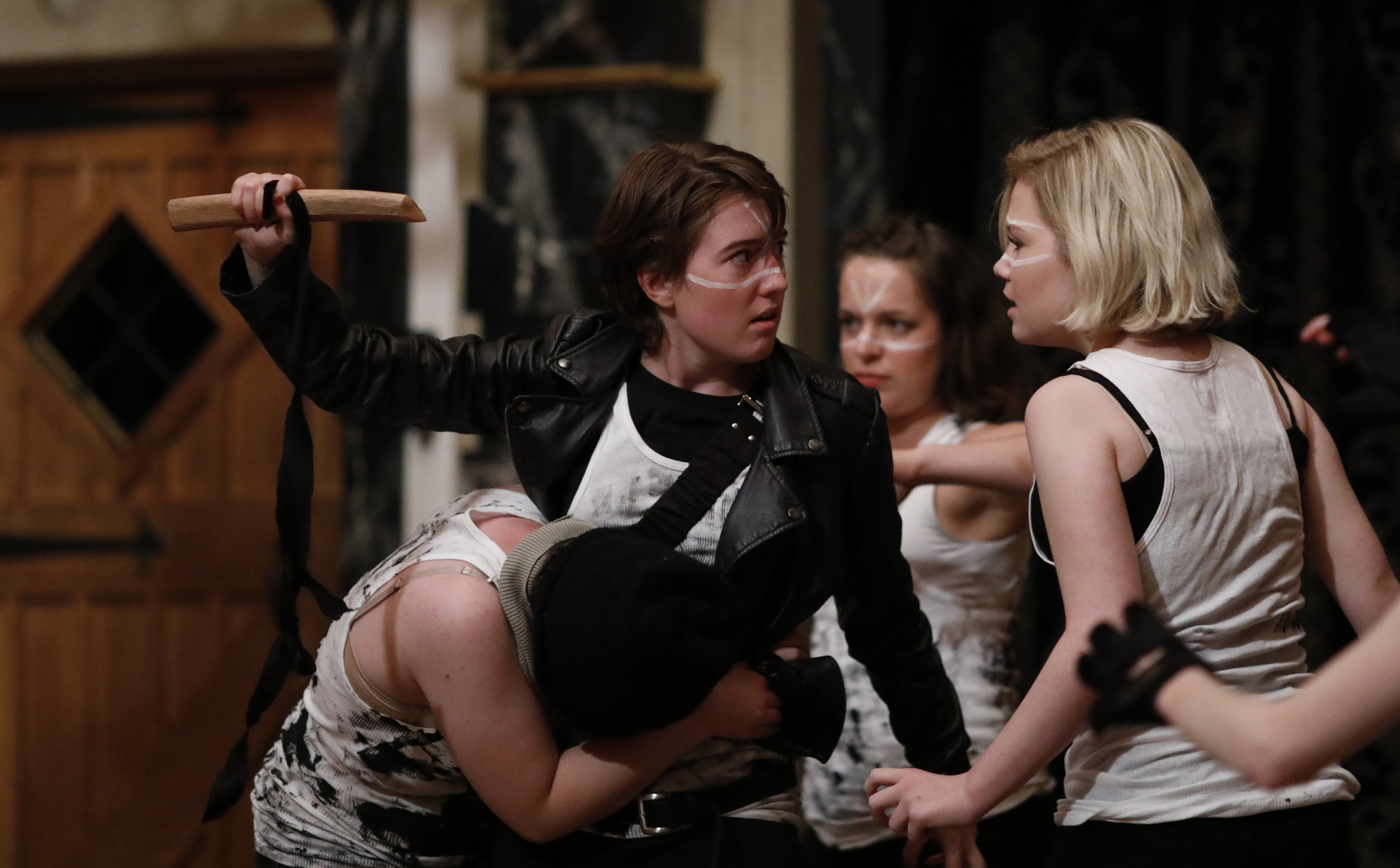
Instead of casting six Beatrices, I carefully considered the reasons why the campers said they wanted to play her. Like Sally, who wanted to play Beatrice because, “She’s sarcastic, witty and I wish I could do comebacks to people I don’t get along with like Beatrice does.” Sally specifically wanted to do “the scene where Beatrice tells Benedict to kill Claudio, [because] it’s filled with so much emotion and it would interesting to play.” Sounded to me like Sally wanted to play a woman wearing her wit as armor while riding into a high-stakes battle of words against a worthy adversary in a scene where everything is on the line. Beatrice certainly fits that bill, but she’s not the only one. In fact, Shakespeare provides a multitude of options for exploring those sorts of things through that sort of character; casting Sally was just a matter of choosing the right one.
Now seems like a pertinent time to mention that I have three (yes, three) university degrees in Shakespeare, resulting in an exhaustive knowledge of the characters and scenes in all 38 plays included in the Shakespearean canon. Despite what my parents may believe, that knowledge comes in useful from time to time. Creating this new Showcase format was definitely one of those times.

I cast Sally in a role she’d never heard of: Elizabeth Gray, a character from Shakespeare’s first history tetralogy. We meet her in Henry VI, Part 3 and Shakespeare continues her story in the sequel, Richard III. Paired with a camper who wanted nothing in the world so much as to play the croockbacked spider Richard himself, Sally played Elizabeth in Act Four, Scene Four of Richard III, a crackling passage of stychomythic zingers with wordplay more treacherous than making a bet with a Sicilian when death is on the line.
“That is an experience I will never forget.” -Sally Tennant-Hertzerling
I went through that process with each and every camper in both sessions. Using the raw material of the campers’ stated hopes and dreams as my base, I organized each Showcase around a central theme — “love” in Session 1 with A Love Story (In Three Acts) and “power” in Session 2 with Playing Politics — and worked with the campers in a collaborative, semi-devised, super-truncated rehearsal process. We performed each show in the early modern playing space at the Stuart Hall School on the second Saturday of each session, and invited friends, family and members of the Staunton community to join us for the final performance and subsequent ice cream social.
Was it perfect? There’s no such thing. Did it serve the mission of camp? You bet it did. Will we do the exact same thing in ASCTC 2018? I don’t know. What I do know is that listening to the campers when they say what they want — really listening — is the only way to even begin to give them what they need. And in order to listen to their answers, I have to ask them the questions.
“I got to play my dream role and it was awesome. Keep listening to suggestions, I think that’s what made Showcase great this year, it felt more personal and made by the campers. I enjoyed the idea of connecting scenes by a specific theme.”

I know something else, too: how freakin’ good it was for me to have scheduled time to work with the campers, because it turns out that if I don’t schedule time to work with the campers, I won’t be working with any campers, ever.
2. Schedule time to work with campers.
I love my job. I spend more time with budgets and spreadsheets and CRM software than I imagined I would, yes, but that comes with the territory of working in the real world at a real nonprofit arts organization. Everybody gets to wear many hats, and I like putting on the caps that continue to challenge me to learn and do things outside of my comfort zone — all of them. I still work with students year round. I mean, last week, Sarah Enloe and I went to CCCA to do our fifth(? sixth?) annual Christmas Carol workshop for their young residents. There was dancing. I wore a tutu and ended up covered in glitter.
Did I mention I love my job?
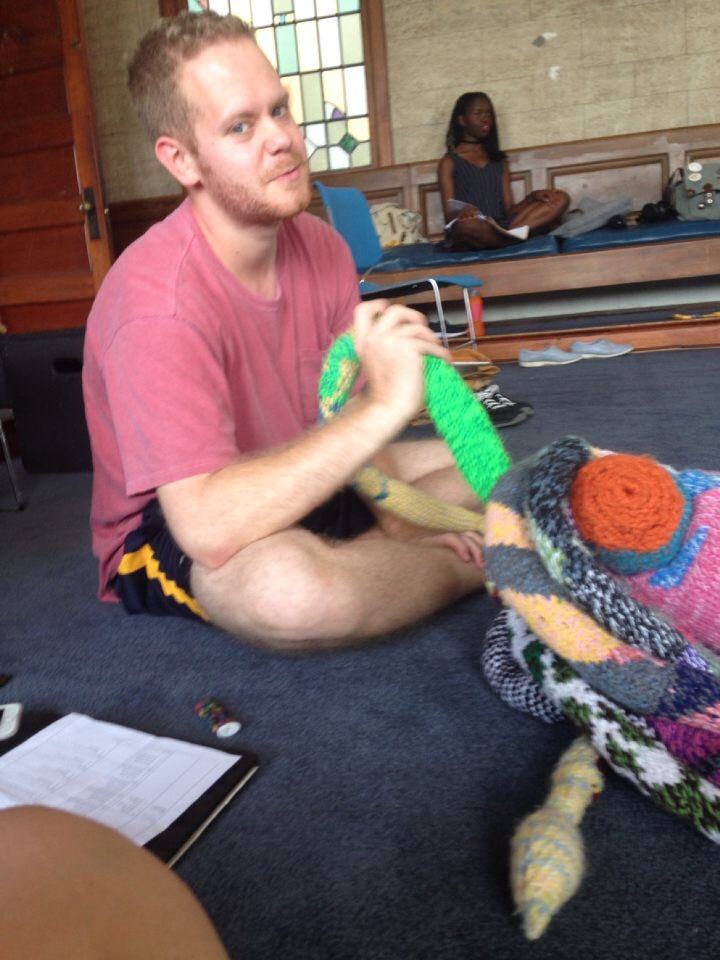
Yet, I spend many of my days during camp doing not-camp stuff (which usually involves sitting in front of a computer). In a sense, that’s how it should be: ASCTC draws some fierce professional talent, which means every summer we gain an outstanding artistic and residential staff more than capable of running the day-to-day of camp with minimal input from me. When they discover a fire, they always let me know, and I always sprint right over — but by the time I get there, out of breath and wielding a fire extinguisher, the flames are long gone and, more often than not, a cadre of RDAs are looking at me funny while grooming a baby Phoenix (which, naturally, they bred from the leftover ashes — see photo, right). They’ll always inform me, but they don’t need me for every single thing.
I’m not mad about this, but I do find myself stewing with jealousy once camp is in session and everyone is making art and I’m chipping away at my email inbox.
Why do I do that to myself? When camp’s not in session (no, I do not disappear or hibernate between summers) I make sure I take the time to work with students. In the fall, I can build the camp registration process while leading workshops for the English Speaking Union regional competitors from both the Lexington and Charlottesville branches. I started a free drama club on the weekends, I train playhouse tour guides and teach students of all levels during the week, and I still manage to find time to attend departmental budget meetings when camp isn’t in session, so why on earth can’t I do the same when camp is in session?
Turns out that I can. I just have to make sure to make the time without taking all the time I have. Striking that balance is difficult, and I don’t have it down perfect yet, but I made great strides in the right direction last summer.
On a good day during ASCTC 2017, I got to teach a college credit course. On a great day, I got to teach a workshop (I still make the schedule, which means I will be introducing campers to audience contact in Shakespeare until I’m fired or dead) or do some text coaching. On the best days, I got to do one or both of those things and work on Showcase rehearsals.
Stepping out of the office into the sunshine of camp (no matter what the weather is really like) is mandatory. Why else are we doing all of this, anyway? I know I can’t be at camp all day every day (no matter how much I’d like to be) but from now on, I will be at camp for at least a moment during every day of ASCTC 2018.

3. Speaking of making time…. Have a Vicky. And an Olivia. And maybe some interns.
After ASCTC 2016, I waxed thankful about the invaluable help I received from Camp Life Coordinators Tess Garrett and Adrienne Johnson, who really should receive any and all credit I happily take for keeping the campers fed, healthy, and safe during their time with us.
Tess officially passed the Camp Life torch to Adrienne in the middle of ASCTC 2016, and she shouldered it herself, valiantly and single-handedly, through both sessions (and an Extended Experience Week) of ASCTC 2017. Just like I shouldered the Camp Director bonfire all by myself, on my own two shoulders, with no help from anyone.
… is anybody buying this?
I didn’t think so.
The only thing better than having an Adrienne is having an Adrienne with an assistant. The only thing better than an Adrienne with an assistant is having my own assistant! Enter the admin and camp life assistant positions (which we called “Vicky” and “Olivia,” respectively, during their debut season at ASCTC 2017).

Who helped Adrienne stuff welcome packets, make nametags and dorm room door signs, decorate the callboard, create and update and post the daily schedule, keep the headcount for every single meal in Hunt Dining Hall, sign campers in and out during free time, and go out to get stuff whenever we realized we needed something we didn’t have? That would be Olivia Pedigo.

Who was my assistant director for both Showcases, helped me choreograph the broadsword fight for 1 Henry IV, organized and tracked camper records and registrations and audition forms and health insurance info, supervised script prep and printing, and stayed up til 3AM helping me pit cherries to make pies for the Session 1 pre-orientation picnic because hello we were doing Titus that session and everyone knows that if you’re doing Titus then you can’t have a pre-orientation picnic without pies? That would be Vicky Vail.
Who prepped the scripts, glossed the text, took blocking notes, wrote dramaturgical essays, pulled props and costumes, and even occasionally stepped up to step in to the shows when needed? That would be the Production Interns, another ASCTC 2017 staff addition. Ryan Wilson, Alex Kingsley, Chase O’Neill, and Olivia Pedigo (serving double duty as a Production Intern in Session 2, while Ryan worked on a production of Macbeth in Richmond) were the best inaugural crop of Production Interns a Camp Director could ask for. Thanks to their trailblazing, I know we’ll have more of the same in the summers to come.
4. Don’t decide (especially not a whim) to put all your informational eggs in one website basket and then crash it. Repeatedly.
I decided camp needed a real, dedicated website. I set up a WordPress account, bought the domain asctheatrecamp.com and started building. WordPress makes it look incredibly easy, which is my only excuse for thinking that building and hosting a website is, in itself, incredibly easy. So when I got annoyed at a random, minor restriction of the WordPress platform, I thought “Forget WordPress, I’ll host the camp website ON MY OWN!”
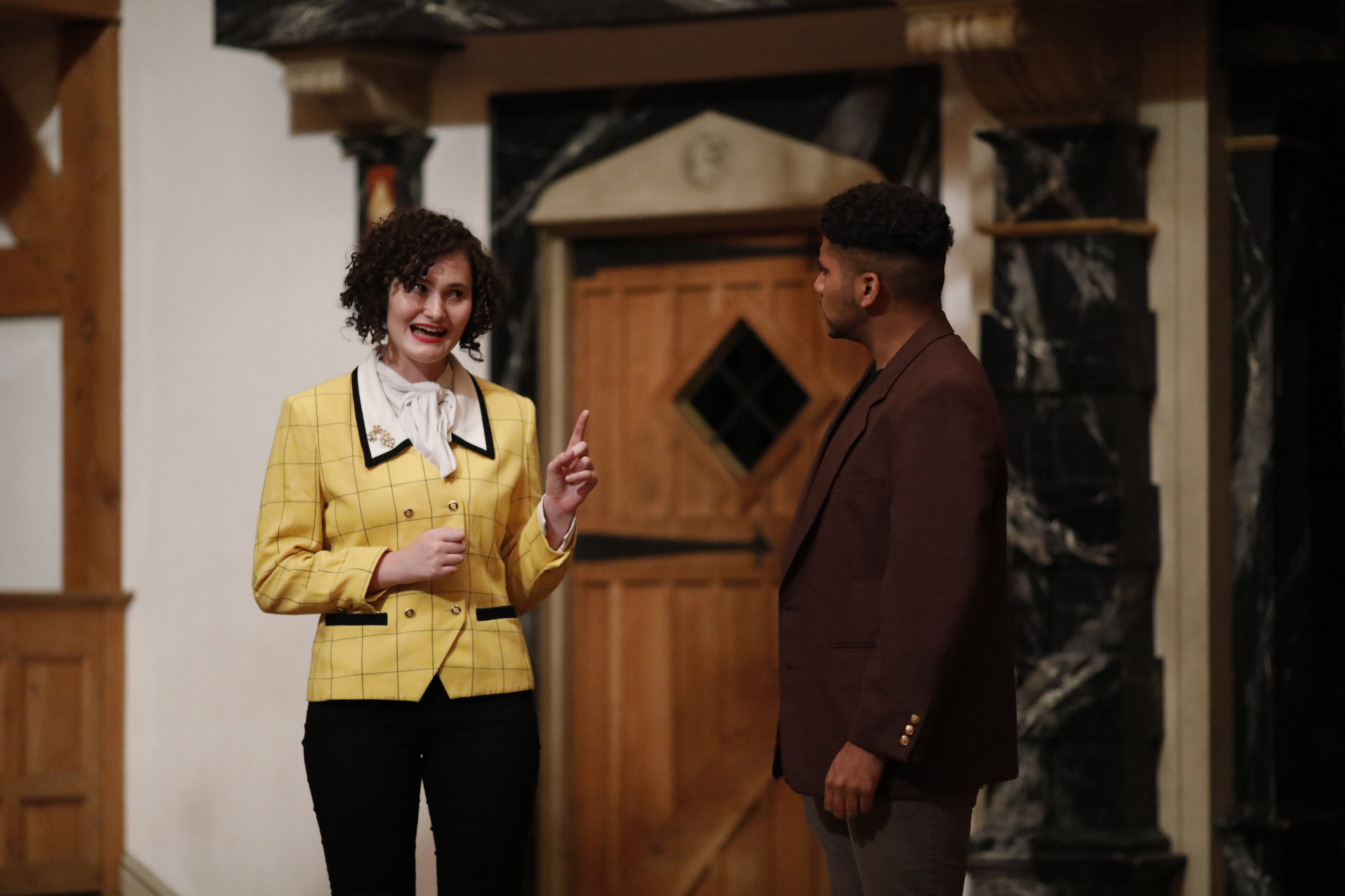
What? It didn’t seem crazy at the time. What could possibly go wrong?
I won’t go into detail (because I still don’t really understand anything about building and hosting websites) but the long and short of it is: WEBSITES ARE HARD PEOPLE GO TO SCHOOL FOR THAT AND I GOT IN OVER MY HEAD.
The website problem snowballed into an email problem (any parents reading this are probably rolling their eyes afresh at receiving dozens of “Tuition Payment Reminder” emails even though they had already paid tuition and also camp had ended several weeks prior). The email problem snowballed into a database problem. I wasn’t in over my head anymore. I was buried alive.
The good news: I asked for help, and the people who went to school for these things dug me out, dusted me off, and set me straight so that I wouldn’t make the same mistakes again. I did my best to be upfront about the reasons behind the various annoyances and inconveniences I caused with my internet hubris and I promised to never, ever, ever jump off another building without tying on a safety harness because really, how far of a fall can it be?
5. The campers are always, always worth it.
The transition from childhood to adulthood, beginning with puberty around the age of 12 and ending after an explosion of frontal lobe development around the age of 21, is when who you were turns into who you will become. As such, it’s inherently a time of emotional instability. Or, to put it another way, it sucks.
ASCTC makes it suck slightly less.
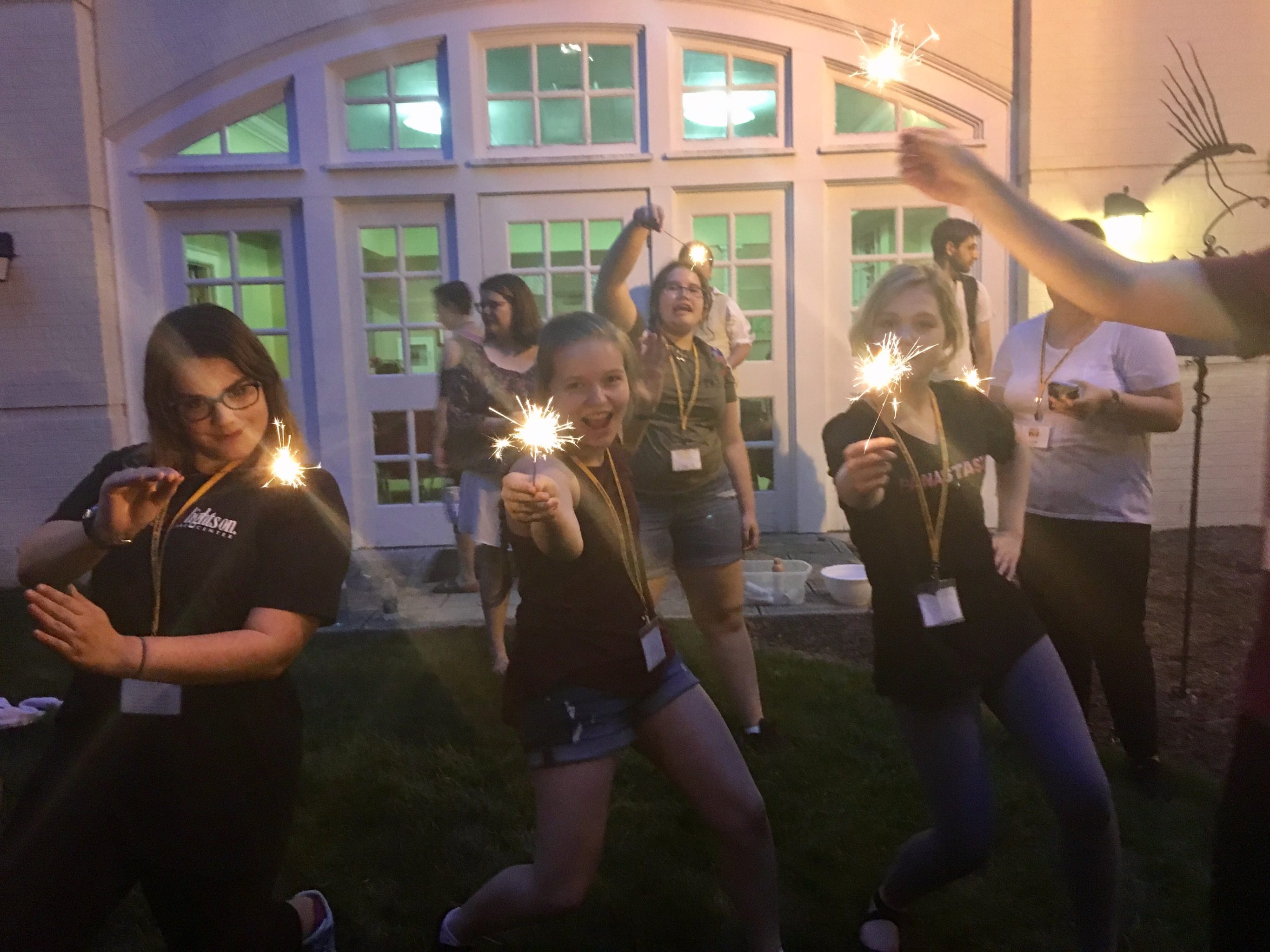
How is this true? I’m not quite sure. But I know it is because I’ve seen it happen. I’ve seen it happen over and over again during my time at the ASC. Dozens, maybe hundreds of times.
For that, I will battle demons, devils, politicians, bosses, cab drivers, and the entire US Navy if I have to. Why, I can deal with self-doubt and smile through slip-ups, weather setbacks with patience and spend my nights awake and working. I’ll work harder than a CrossFit trainer. I’ll wait longer than Patience on a monument. I’ll reach further than any selfie stick, teach the oldest dog the newest tricks, change lives for the better for as long as I can, and set the murderous Machiavel to school. (Wait, what?)
Anyway: I’d do it all backwards and blindfolded if it meant life would suck less for just one camper. What wouldn’t I do for dozens? Hundreds? Thousands? Millions? How could anything be worth more than that?
I promise to you, here and now, this solemn and most sacred vow: the day I stop believing that will be the day I leave this job. And I don’t plan on leaving anytime soon.
